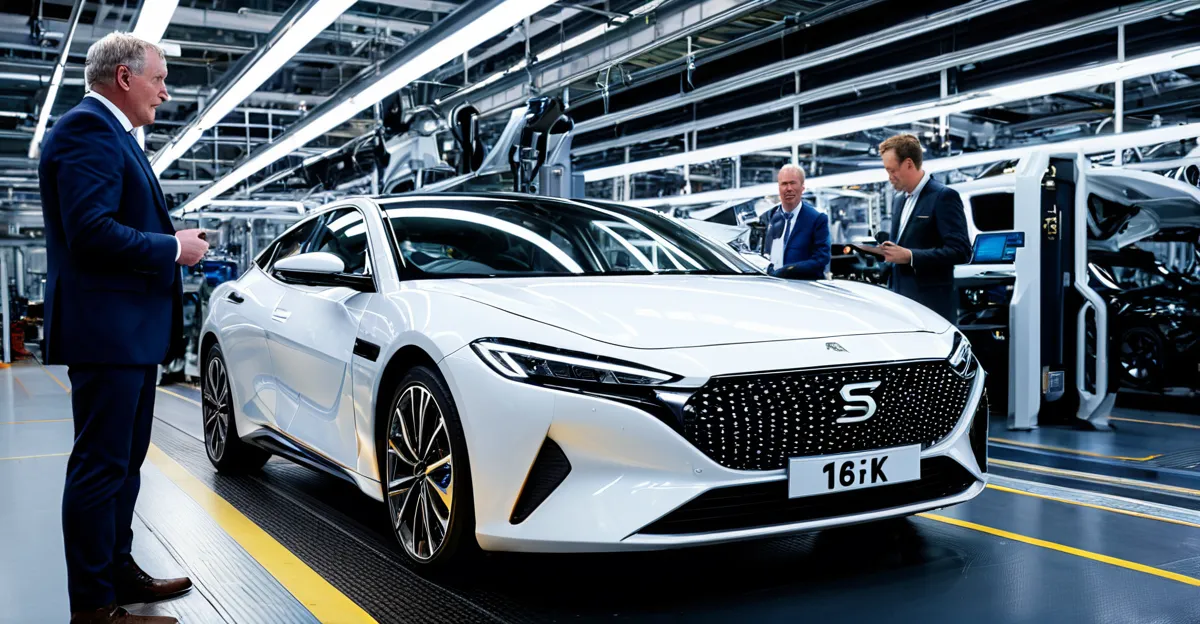Reshaping the Future of UK Automotive Manufacturing: Innovations Driving Change
The UK automotive manufacturing sector is on the cusp of a significant transformation, driven by a plethora of innovative technologies and trends. From the rise of electric vehicles to the integration of advanced digital technologies, the industry is undergoing a seismic shift that promises to redefine the future of automotive production.
Electric Vehicles: The New Frontier
One of the most compelling trends in the UK automotive industry is the rapid adoption of electric vehicles (EVs). As governments worldwide impose stricter emissions regulations and consumers become increasingly environmentally conscious, automotive manufacturers are scrambling to meet the growing demand for EVs.
Additional reading : What is the impact of digitalization on UK automotive sales strategies?
Market Growth and Adoption
The UK market for electric vehicles is experiencing exponential growth. According to recent statistics, EV sales have surged, with many automotive manufacturers committing to fully electric lineups in the near future. For instance, companies like Jaguar Land Rover and BMW are investing heavily in EV technology, with plans to launch a range of new electric models.
Key Players and Models:
Topic to read : What Role Will Electric Vehicles Play in Shaping the UK’s Automotive Industry?
- Jaguar Land Rover: The company has announced plans to electrify its entire lineup by 2030, with models like the Jaguar I-PACE already making waves in the market.
- BMW: BMW is expanding its electric offerings, including the popular i4 and iX models, which are set to play a crucial role in the company’s electric vehicle strategy.
Charging Infrastructure
A critical component of the EV revolution is the development of robust charging infrastructure. The UK government has pledged significant investments to expand the national charging network, ensuring that drivers have access to charging points across the country.
| Charging Point Type | Current Availability | Projected Growth by 2030 |
|----------------------|----------------------|---------------------------|
| Public Charging Points | 30,000+ | 150,000+ |
| Fast Charging Points | 5,000+ | 20,000+ |
| Home Charging Points | 1 million+ | 3 million+ |
Digital Transformation: Smart Factories and Predictive Maintenance
The integration of digital technologies is another key area where the UK automotive industry is seeing significant innovation. Smart factories, powered by technologies like artificial intelligence (AI), machine learning, and the Internet of Things (IoT), are revolutionizing the manufacturing process.
Smart Factory Initiatives
Companies are adopting digital twins and real-time data analytics to optimize production processes. For example, the use of digital twins allows manufacturers to simulate production scenarios, identify potential bottlenecks, and make data-driven decisions to improve efficiency.
Example:
- BMW’s Digital Factory: BMW has implemented a comprehensive digital factory strategy, using AI and machine learning to predict and prevent production issues. This approach has significantly reduced downtime and improved overall production efficiency.
Predictive Maintenance
Predictive maintenance is another area where digital technologies are making a significant impact. By using sensors and real-time data analytics, manufacturers can predict when maintenance is required, reducing the likelihood of unexpected downtime.
Benefits:
- Reduced Downtime: Predictive maintenance can reduce production downtime by up to 50%, according to industry estimates.
- Cost Savings: By performing maintenance only when necessary, manufacturers can save millions of dollars in maintenance costs.
- Improved Quality: Predictive maintenance ensures that vehicles are produced under optimal conditions, leading to higher quality products.
Autonomous Driving and Self-Driving Technologies
Autonomous driving is a trend that is gaining traction globally, and the UK is no exception. While fully autonomous vehicles are still in the experimental phase, several UK-based companies are at the forefront of this technology.
Regulatory Framework
The UK government has been supportive of autonomous driving, with regulations in place to facilitate the testing and deployment of self-driving vehicles. Companies like Waymo and Jaguar Land Rover are actively testing autonomous vehicles on UK roads.
Regulatory Milestones:
- 2023: The UK government announced plans to allow the use of self-driving cars on motorways by 2023, subject to safety approvals.
- 2025: Full deployment of autonomous vehicles is expected, pending successful trials and regulatory approvals.
Technological Advancements
The development of autonomous driving technologies relies heavily on AI and machine learning. These technologies enable vehicles to interpret real-time data from various sensors, making decisions in real-time to ensure safe and efficient driving.
Example:
- Jaguar Land Rover’s Autonomous Project: Jaguar Land Rover is working on an autonomous driving project that uses advanced AI algorithms to navigate complex road scenarios. This project aims to develop vehicles that can operate autonomously in various conditions.
Energy Storage and Battery Technology
The rise of electric vehicles has highlighted the importance of advanced energy storage solutions. UK-based companies are at the forefront of developing innovative battery technologies that are more efficient, sustainable, and cost-effective.
Sodium-Air Fuel Cells
Researchers at MIT, though not based in the UK, have developed a sodium-air fuel cell that could have significant implications for electric vehicles. This technology offers more than three times the energy density of current lithium-ion batteries, potentially revolutionizing the EV market.
Potential Impact:
- Increased Range: Vehicles equipped with sodium-air fuel cells could have ranges exceeding 500 miles on a single charge.
- Reduced Costs: The use of sodium, a more abundant and cheaper material than lithium, could significantly reduce battery production costs.
Global Supply Chain and Manufacturing Trends
The UK automotive manufacturing sector is deeply intertwined with global supply chains. Recent disruptions have highlighted the need for more resilient and agile supply chain strategies.
Diversification and Localization
To mitigate risks associated with global supply chains, many UK automotive manufacturers are diversifying their supplier base and localizing production. This approach helps in reducing dependency on any single supplier and ensures more stable production processes.
Example:
- BMW’s Localized Supply Chain: BMW has been working to localize its supply chain in the UK, partnering with local suppliers to reduce reliance on international logistics.
Real-Time Data Analytics
The use of real-time data analytics is becoming increasingly important in managing supply chains. By leveraging IoT and AI, manufacturers can monitor supply chain operations in real-time, making swift adjustments to address any disruptions.
Benefits:
- Improved Visibility: Real-time data analytics provide a clear view of the entire supply chain, enabling better decision-making.
- Reduced Risk: By identifying potential issues early, manufacturers can take proactive measures to mitigate risks.: The Future of UK Automotive Manufacturing
The UK automotive manufacturing sector is poised for a transformative future, driven by innovations in electric vehicles, digital technologies, autonomous driving, and advanced energy storage. As the industry continues to evolve, it is clear that these trends will play a pivotal role in shaping the automotive landscape.
Practical Insights and Actionable Advice
For those involved in the automotive industry, here are some key takeaways and actionable advice:
- Invest in Digital Transformation: Embrace smart factory technologies and predictive maintenance to optimize production processes.
- Focus on Electric Vehicles: Develop and invest in EV technology to meet the growing market demand.
- Diversify Supply Chains: Localize production and diversify your supplier base to ensure resilience against global disruptions.
- Stay Updated on Regulatory Changes: Keep abreast of regulatory developments, especially those related to autonomous driving and EV adoption.
As the UK automotive industry embarks on this journey of innovation, it is evident that the future will be marked by significant growth, new opportunities, and a commitment to sustainability and technological advancement.
In conclusion, the future of UK automotive manufacturing is bright and filled with promise. As we navigate these exciting times, it is crucial to stay informed, adapt to new trends, and leverage the latest technologies to drive innovation and growth in the industry.

